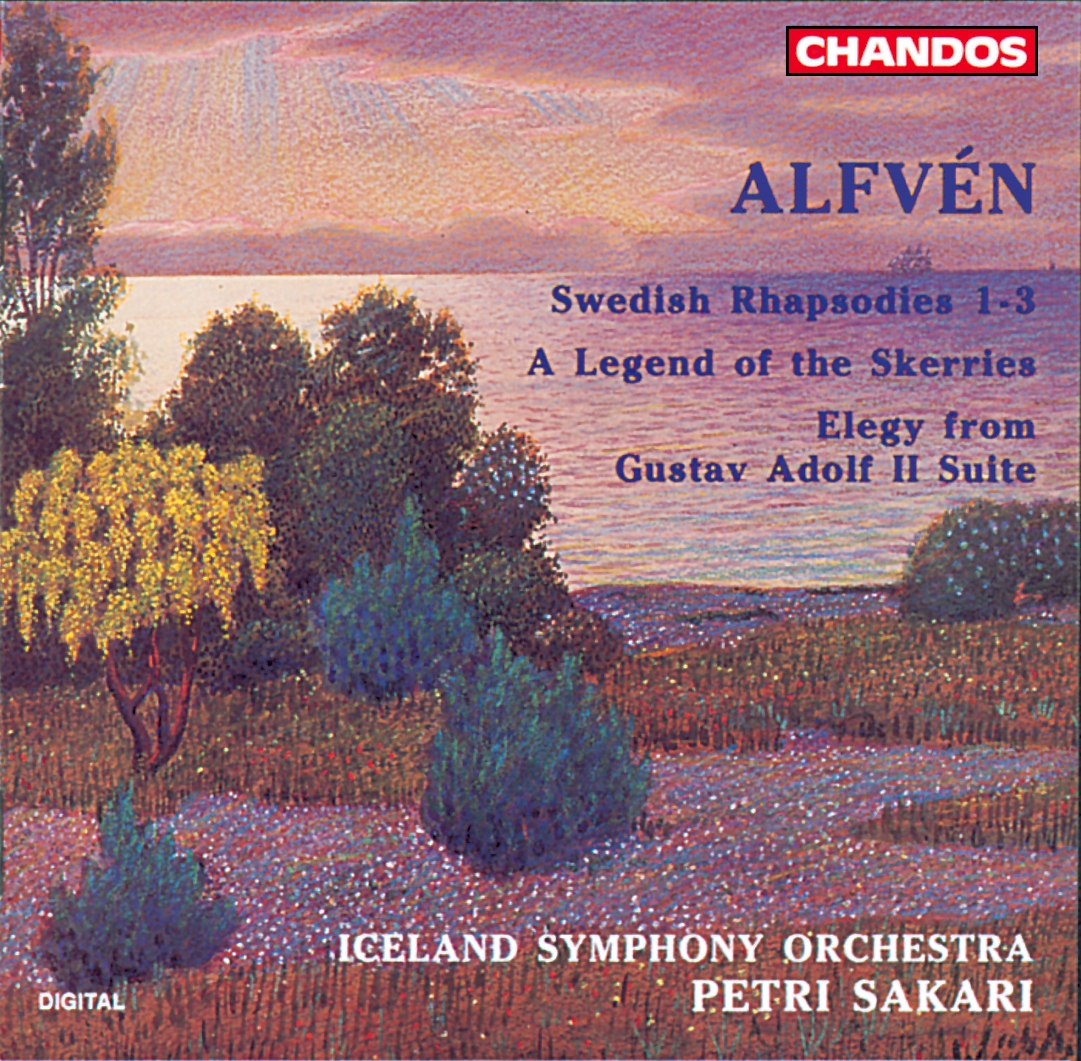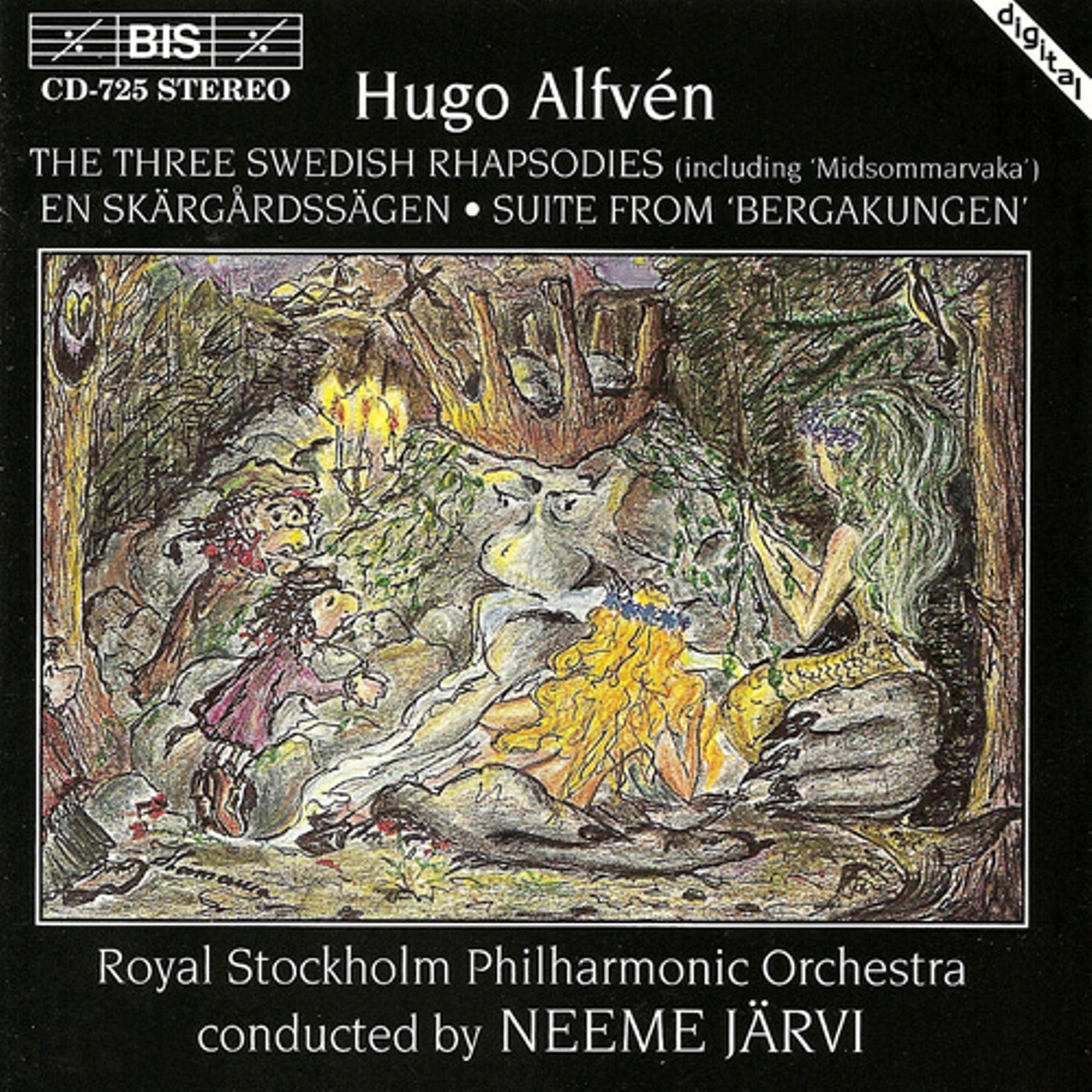I recently inquired regarding the difference between the terms Scandinavian and Nordic.Apparently, Scandinavia refers only to Norway, Sweden, and Denmark, whereas being Nordic refers to that same trio of countries plus Finland, Greenland, Iceland, and a few others I am less familiar with.
In the case of this recording, a Nordic orchestra is performing the music of a Scandinavian composer. Take That!
I think this Chandos recording was the first I owned which included all of Hugo Alfvén's Swedish Rhapsodies together. The earlier BIS set with Neeme Järvi gathered a similar program together, and will be my main point of comparison (cover pictured below in black). Both are good recordings - the Chandos one provides the 5-minute Elegy as an extra, while BIS offers the Suite from Bergakungen. While BIS may time longer by some 7 minutes, I love the Elegy orchestral miniature to bits - I must have listened to it a thousand times when I first heard its music.
The Three Swedish Rhapsodies each have their own personality: The first rhapsody is the folksiest, the second runs akin to Brahms' Academic Festival Overture, while the third is moodier, atmospheric, darker, and much, much longer. This triptych of orchestral Sweden contains more than mere potpourris or folk-tune medleys; Alfvén fashions them into fully developed symphonic poems which just so happen to have Swedish folksong attributes.
I have never taken to A Legend of the Skerries. Its Late Romanticisms simply don't carry me through its runtime, nor is the work helped by melodic material which just doesn't stick to this listener. The music sort-of heaves and sighs with the water, although the middle march portion is interesting. Oh well... I will try again, I am sure.
Petri Sakari brought the Iceland Symphony Orchestra successfully into the CD age, where they mostly recorded the music of Nordic composers, although they have since branched out to other repertoire on record.
They certainly do a wonderful job here. I found little to compare between the BIS and Chandos recordings, where at one time I might have found this performance a little light on its feet, I just don't hear that anymore. Järvi might have a bit more of a skip in his step, but only just. Iceland certainly stands up to their Swedish counterparts pretty darn well in comparison. Both, however, are enjoyable!
A review from 2006
The
most famous Swedish composer, aside from Franz Berwald, has to be Hugo
Alfven. His music is ultra-Romantic, and on this CD, the influence of
Swedish folk music is in the forefront with five works: Alfven's three
Swedish Rhapsodies, his Legend of the Skerries, and the beautiful Elegy.
The
first Swedish Rhapsody is entitled Midsummer Fest, the celebration of
the longest day of light. Like the day it celebrates, the work is sunny
and radiant. The opening melody is like an old friend, one that is
immediately enjoyable and fondly remembered. The theme goes from
instrument to instrument, but when the full orchestra tackles it, the
immediate joy is overwhelming. The middle slow section begins with warm
strings and an echo of the opening idea, but a new, slightly
melancholy, soaring melody takes over, and switches to a powerful
emotion of longing. When the pace quickens, a new sprite melody takes
over, again bringing back the happiness. The music erupts into yet
another section, more reminiscent of a Scottish reel. The 14-minute
work ends with fanfares and jubilation. The second Swedish Rhapsody,
Uppsala Rhapsody, was commissioned for the University of Uppsala. It is
a sort of medley, or more appropriately termed, fantasy, of popular
college tunes. The 11-minute rhapsody begins hushed with a chorale Alma
Mater feel, into a more noble, almost British-sounding tune. Many more
are strung together, but nothing is particularly distasteful, and the
sometimes familiar settings are interesting to hear. The end is
heralded by a brilliant fugal treatment and a rousing conclusion. The
final, and longest, Swedish Rhapsody, timing at 20+ minutes, shows
Alfven's love of setting tragic sounding music. A plaintive double-reed
solo opens the Dalecarian Rhapsody, as Alfven's program of a lonely
mountain shepherdess dreams about a different life. Two or three times
the melancholy if broken up by various rustic dances, whether conjuring
up some past memory or evoking a young girl's longings, is up to the
listener. All three Swedish Rhapsodies on three different aspects of
Swedish life. The music is rooted in Swedish music, often reminded of
Dvorak and Grieg, it is creative and imaginative. It is especially nice
to have them all on one disk!
A Legend of the Skerries takes
place on an Autumn evening, first in the moonlight, then a storm comes,
and then a calm. The skerries is described as the place where the water
meets the rocks, a place of eternal sprays of water and swirling pools.
The calm of the opening easily gives way to the dynamic waves of the
water, first a love of the sea is present, but darkness eventually
arrives as the storm nears and nature adjusts itself for the impending
drama. Throughout the 18-minute work, there is a general optimism and
love of the sea, however, and the work ends peacefully. The sweet and
personally emotional Elegy is a beautiful setting from stage music based
on the life of King Adolph II. The King is remembering various
passionate sequences of his youth, and the music swells emotionally. A
lovely and emotional 5-minute work.
The Iceland Symphony
Orchestra under Petri Sakari give lush and moving performances. The
Chandos label sound is warm and all voices of the orchestra speak very
clearly. Terrific and well-performed music, it is nice to have all of
the rhapsodies, plus some nice additions, on a single disk. For the
thrifty spender, you can find these works on the Naxos label, usually
paired with a symphony or ballet, but this all folk-based CD is a good
one to have, and competitively, the better performance.

Works
Swedish Rhapsody 1, op. 19
Swedish Rhapsody 2, op. 24
Swedish Rhapsody 3, op. 47
Legend of the Skerries, op. 20
King Gustav Adolf II: Elegy, op. 49
Performers
Iceland Symphony Orchestra
Petri Sakari, conductor
Label: Chandos
Year: 1994
Total Timing: 70.26
I think this recording stands on its own just fine, despite the starrier competition.
Iceland is weighty and polished, and Hugo Alfvén's music is not only well crafted, but a lot of fun too.
Enjoy!




Comments
Post a Comment